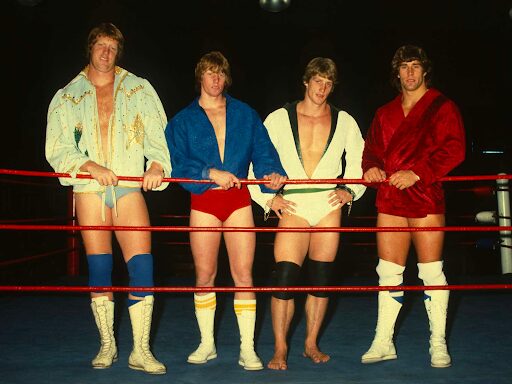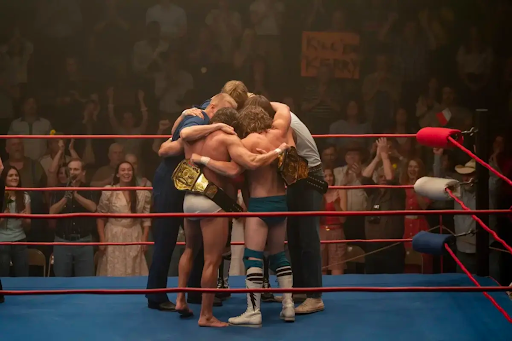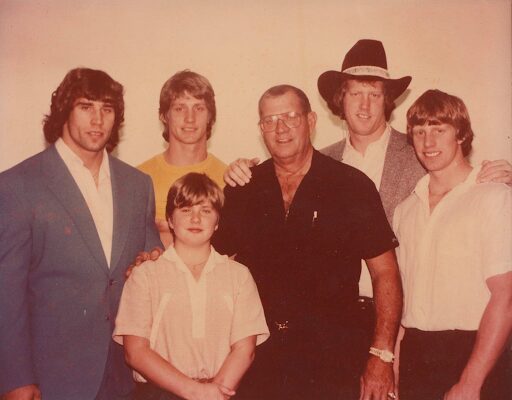It’s a tag team for the ages, as the Merry-Go-Round Film section presents the first edition of Hard Time Blues for 2024. This week, HTB co-founder and editor Luke Phillips reviews A24 and Sean Durkin’s THE IRON CLAW, about the tragic heroes of Texas pro wrestling lore, the Von Erichs.
The Von Erichs are hot again. It’s been weeks since the release of A24 and Sean Durkin’s THE IRON CLAW—a period biopic in the prestige style of THE WRESTLER or a host of maudlin, Oscar bait biopics from BOHEMIAN RHAPSODY to NAPOLEON on down. The film has seen a decent critical and commercial response for its portrayal of the tragic Texan legends. As an avid wrestling purist, I came into the experience with a definite chip on my shoulder; the nerd in me felt a constant urge to poke ahistorical holes in the film’s presentation and narrative surrounding the Von Erichs and their fabled curse. This distortion of the truth is definitely of a piece with the tall tales and noted fallacies wrestlers often embellish in their own recalling of the past. As the sole remaining and eldest brother of the Von Erich clan, Kevin Von Erich is also the last point of oratory historical record for the family. In the ring, Kevin was known for his wild barefoot style and his “shoot” punches (i.e. when he slugged his opponents, he was actually hitting them as hard as he could). While the filmmakers and actors insist Kevin’s involvement in the film was muted out of respect for his privacy, I can’t help but feel like they decided to play with kid gloves in their attempt to honor his memory.
Zac Efron’s haunted visage as Kevin looms over this film. With each Von Erich expunged from this Earth, it looks like a piece of his soul has been ripped out. As he bottles up his emotions, he exudes the aura of a twisted Jack Kirby grotesque. The Von Erichs had the physiques of Greek Gods, superhero-like proportions that made them positively worshiped by the Dallas-Fort Worth teenybopper set. If you actually go back and watch the old WCCW tapes, there was seemingly nothing more exciting than Von Erich matches at their peak. Their breathless, brawling, minute-to-minute and bell-to-bell action was not only a precocious precursor to the modern Western wrestling house style, but it was complemented by fast-paced cuts and multi-camera set-ups that anticipated modern presentation of the sport. THE IRON CLAW is at its best when it embraces these nascent, late-‘70s/early-‘80s golden god vibes—the jocular, fraternal hangout movie where everyone is cruising to Rush and the Nuge.

Unfortunately, that fun-fun-fun vibe gets expunged often and thoroughly by the overbearing weight of The Curse of The Iron Claw, the curse that Fritz and Kevin doggedly maintain is inflicting the bloodline. This rigor mortis extends to most of the actual wrestling portrayed in THE IRON CLAW, which leaves a lot to be desired. While wrestling coordinator and veteran Chavo Guerrero Jr. has done an admirable job preparing these actors to perform in-ring techniques for the film—similar to his work for Netflix’s GLOW and NBC’s YOUNG ROCK—in execution, the cast’s mat skills are stiff slo-mo variations on classic Von Erich thrills and ass-kickery. A lot of the wrestling scenes are better-lit versions of the B-roll in Vice’s DARK SIDE OF THE RING; come to think of it, a significant portion of the dialogue in this film was cribbed from the DARK SIDE OF THE RING episode on the Von Erichs. There seems to be a significant influence taken from the morbid, true crime aspect of “the business” without actually depicting the vice and crime. The film shows the Von Erichs sharing the ring with lauded wrestling icons like Bruiser Brody and Gino Hernandez without revealing that these men themselves died brutal, unnecessary deaths just as the Von Erichs had (and Brody was, in fact, with David Von Erich on the night he died). The Curse of The Iron Claw is the curse of wrestling itself: the curse of capitalism. There is, was, and remains an endemic of worker exploitation, and desperate, violent means to escape a desperate, violent profession: diligently keeping kayfabe as Fritz Von Erich suffocated his family until his sons picked themselves off one by one.
At the same time, the game performances from the main cast across the board cultivate an evocative emotional throughline that can be appreciated by a general audience. Holt McCallany seemingly is Fritz, Stanley Simons astutely portrays the gangly and doomed creative soul Mike, and, well, THE BEAR’s twunk ass might have put a little bit too much of the Brando sauce for his take on ultrahimbo Kerry. To borrow inflammatory carny parlance, people can’t seem to get enough of these vanilla midget versions of the Von Erichs. Potentially, could this film be a gateway for the fabled “casual fan” to start watching modern wrestling product? I must admit, watching the film a few days before Christmas with my own brother was enough to tug at my ol’ heartstrings and get me teary-eyed, despite all of my nerdlinger complaints. The sad parts were effectively devastating and capture the pathos of this family’s tragedy as passably as possible.
Still, some baffling creative decisions keep me from praising or rewarding the film a higher mark, chief among them the removal of the youngest Von Erich brother, Chris, and Aaron Dean Eisenberg’s infamous portrayal of Ric Flair. I understand that Ric Flair is a disgusting perverted old lamprey, but he is also The Dirtiest Player in The Game. His function in both the Von Erich legend and this film is so vital, and deserves a crazed stunt casting performance befitting The Nature Boy’s wild coke gaze. Instead, we get some guy who might as well be trying out for EPIC RAP BATTLES OF HISTORY.

The removal of Chris Von Erich especially irks me—and I don’t accept the filmmakers or moviegoers’ explanation that it’s a necessary time cut. Chris’ story is arguably the most tragic of the Von Erichs, considering his asthma and stunted growth made him unsuitable for wrestling. Instead, Chris is composited into Mike and Kerry’s story, since his life and death mirrored his brothers. Chris died grieving Mike, and Kerry died grieving Chris. Kevin found Chris’ body when he died, but in the film, Kevin finds Kerry’s body instead. Unfit to even be immortalized on film like his brothers, Chris doesn’t even get into Heaven at the end of the movie. It’s as if they sacrificed his soul to produce this film.
If this movie is what gets you into wrestling, then God bless you, welcome, and good luck. Wrestling bums me out. It’s a brutal sport that will cripple you as a viewer and the participants emotionally and physically, and it’s also highly exploitative to its workers. At its best, however, the endorphin rush from watching or performing Great Wrestling is so lizard-brained and profound that it basically forces guys to early graves chasing that dragon. It is an ecstasy greater than any drug, performance-enhancing or otherwise.
















Comments